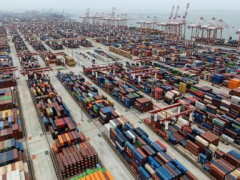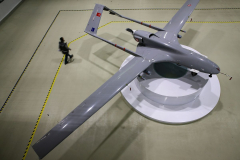NEW YORK — American businesses that rely on Chinese goods reacted with muted relief Monday after the U.S. and China agreed to pause their exorbitant tariffs on each other’s products for 90 days.
Importers still face relatively high tariffs, however, as well as uncertainty over what will happen in the coming weeks and months. Many businesses delayed or canceled orders after President Donald Trump last month put a 145% tariff on items made in China.
Now, they’re concerned a mad scramble to get goods onto ships will lead to bottlenecks and increased shipping costs. The temporary truce was announced as retailers and their suppliers are looking to finalize their plans and orders for the holiday shopping season.
“The timing couldn’t have been any worse with regard to placing orders, so turning on a dime to pick back up with customers and our factories will put us severely behind schedule,” said WS Game Company owner Jonathan Silva, whose Massachusetts business creates deluxe versions of Monopoly, Scrabble and other Hasbro board games.
Silva said the 30% tariff on Chinese imports still is a step in the right direction. He has nine containers of products waiting at factories in China and said he would work to get them exported at the lower rate.
U.S. Trade Representative Jamieson Greer said the U.S. agreed to lower its 145% tariff rate on Chinese goods by 115 percentage points, while China agreed to lower its retaliatory 125% rate on U.S. goods by the same amount. The two sides plan to continue negotiations on a longer-term trade deal.
National Retail Federation President and CEO Matthew Shay said the move was a “critical first step to provide some short-term relief for retailers and other businesses that are in the midst of ordering merchandise for the winter holiday season.”
The news sent the stock market and the value of the dollar soaring, a lift that eluded business owners confronting another dizzying shift.
Marc Rosenberg, founder and CEO of The Edge Desk in Deerfield, Illinois, invested millions of dollars to develop a line of $1,000 ergonomic chairs but delayed production in China that was set to begin this month, hoping for a tariff reprieve.
Rosenberg said it was good U.S.-China trade talks were ongoing but that he thinks the 90-day window is “beyond dangerous” since shipping delays could result in his chairs still being en route when the temporary deal ends.
“There needs to be a plan in place that lasts a year or two so people can plan against it,” he said.
Jeremy Rice, the co-owner of a Lexington, Kentucky, home-décor shop that specializes in artificial flower arrangements, said the limited pause makes him unsure how to app





